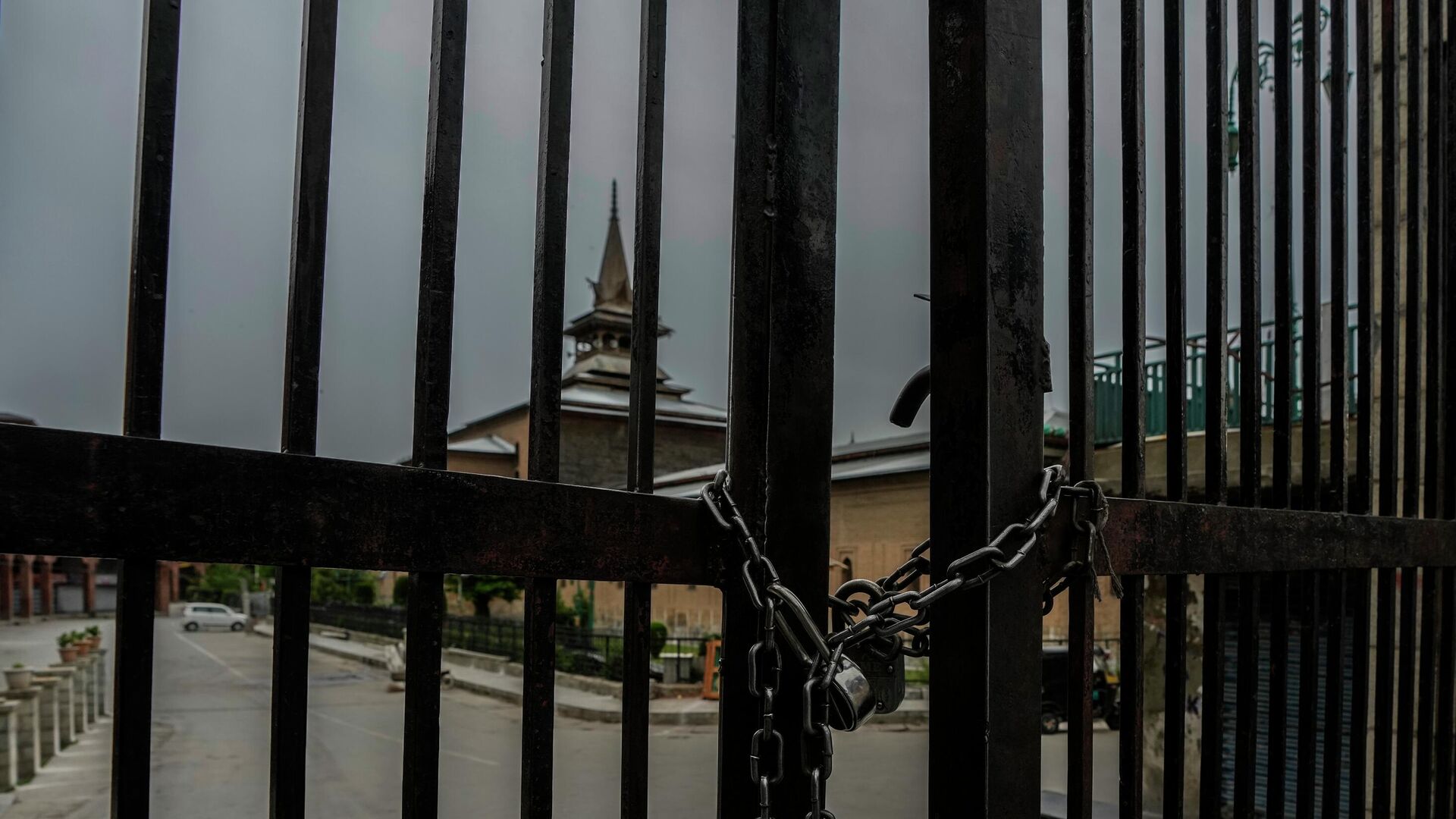https://sputnikglobe.com/20220428/political-row-erupts-in-kashmir-after-authorities-forbid-largest-ramadan-congregational-prayers-1095123954.html
Political Row Erupts in Kashmir After Authorities Forbid Largest Ramadan Congregational Prayers
Political Row Erupts in Kashmir After Authorities Forbid Largest Ramadan Congregational Prayers
Sputnik International
The Jamia, built by Kashmir’s Muslim Sultan Sikandar in 1402, has remained at the epicentre of the region’s socio-political and religious movements. Prayers... 28.04.2022, Sputnik International
2022-04-28T13:17+0000
2022-04-28T13:17+0000
2022-12-08T18:02+0000
kashmir
mirwaiz umar farooq
omar abdullah
pakistan
https://cdn1.img.sputnikglobe.com/img/07e6/05/03/1095235847_0:201:2928:1848_1920x0_80_0_0_b570c7a1904adbcdb006457efcd5ce04.jpg
A political row erupted in India's Jammu and Kashmir union territory on Thursday after local authorities prohibited two key Islamic congregational prayers held annually during the final days of the holy month of Ramadan at the Jamia Masjid -- a historic mosque located in Srinagar city.In a statement, the Anjuman Auqaf Jamia Masjid, a committee which runs and maintains Jamia Masjid, said that the government and police officials visited the mosque premises in Nowhatta land informed the committee that congregational prayers would not be allowed.Muslims consider the last Friday of Ramadan to be one of the holiest days of the year. It is known as Juma’tul Vida or Friday of farewell.Shab-e-Qadr is considered one of the holiest nights in Islam, as Muslims believe the Holy Quran was revealed on this night.On Wednesday, the Auqaf had issued timings for the prayers for Thursday night.Devotees from across the region usually attend the night prayers in Jamia Masjid that continue till dawn. Some of the prayers are usually led by head cleric Mirwaiz Umar Farooq, who has remained under house arrest since August 2019.The mosque has also remained mostly shut for prayers in the last five years, especially since the abrogation of Article 370 and 35A in 2019.What Prompted Kashmir Authorities to Disallow Islamic Prayers?The Jammu and Kashmir administration had allowed the Friday prayers recently in March after a gap of 30 weeks.The government officials maintain that the decision to disallow prayers on the special occasion is an endeavour to foil the possibility of any anti-India protests or sloganeering from taking place.Earlier this month, the Jammu and Kashmir Police had arrested 13 persons for allegedly raising “anti-national and provocative sloganeering” inside the Jamia during its first congregational prayer in Ramadan.Political Parties Slam the ProhibitionMeanwhile, former Jammu and Kashmir chief Omar Abdullah termed the latest restrictions as “unfortunate” and ironic amidst the government’s claims of normalcy in the region.The National Conference party leader said that the government, if not by its words but by its action, is proving that the situation in Kashmir is far from normal.The All Parties Hurriyat Conference (APHC) led by incarcerated Mirwaiz Umar Farooq called the move “outrageous” and against the fundamental human right of performing one's religious practice.“People as in the past, will observe Juma’tul Vida as ‘Youm e Quds' (Quds Day) and ‘Youm e Kashmir’ (Day of Kashmir), to stress upon the urgent need for a peaceful resolution of the lingering Palestinian issue and the Kashmir conflict and the human lives they consume,” the APHC said in a statement.The Kashmir-centric group also termed a recent circular issued by authorities in a private school in Kashmir that asked the staff not to wear hijab – as deeply “distressing”.Retracting the circular later, the school authorities later clarified that it was a matter of miscommunication due to one of their officials. It was meant to be about forbidding the face-covering 'Niqab' in classrooms and not about wearing a headscarf 'Hijab'.Meanwhile, M.Y. Tarigami of the Communist Party of India (Marxist) called the directive as “highly deplorable” and urged the government to reconsider its decision forthwith and allow the people to offer the prayers.
kashmir
pakistan
Sputnik International
feedback@sputniknews.com
+74956456601
MIA „Rosiya Segodnya“
2022
Azaan Javaid
https://cdn1.img.sputnikglobe.com/img/07e6/03/19/1094183852_0:0:1080:1080_100x100_80_0_0_1fd4d8740a02742b3f72f82306742213.jpg
Azaan Javaid
https://cdn1.img.sputnikglobe.com/img/07e6/03/19/1094183852_0:0:1080:1080_100x100_80_0_0_1fd4d8740a02742b3f72f82306742213.jpg
News
en_EN
Sputnik International
feedback@sputniknews.com
+74956456601
MIA „Rosiya Segodnya“
Sputnik International
feedback@sputniknews.com
+74956456601
MIA „Rosiya Segodnya“
Azaan Javaid
https://cdn1.img.sputnikglobe.com/img/07e6/03/19/1094183852_0:0:1080:1080_100x100_80_0_0_1fd4d8740a02742b3f72f82306742213.jpg
kashmir, mirwaiz umar farooq, omar abdullah, pakistan
kashmir, mirwaiz umar farooq, omar abdullah, pakistan
Political Row Erupts in Kashmir After Authorities Forbid Largest Ramadan Congregational Prayers
13:17 GMT 28.04.2022 (Updated: 18:02 GMT 08.12.2022) The Jamia, built by Kashmir’s Muslim Sultan Sikandar in 1402, has remained at the epicentre of the region’s socio-political and religious movements. Prayers have been barred in the mosque since Indian federal government rescinded the semi-autonomous status of Indian-administered Jammu and Kashmir in 2019. Pakistan and China condemned the step.
A political row erupted in India's Jammu and Kashmir union territory on Thursday after local authorities prohibited two key Islamic congregational prayers held annually during the final days of the holy month of Ramadan at the Jamia Masjid -- a historic mosque located in Srinagar city.
In a statement, the Anjuman Auqaf Jamia Masjid, a committee which runs and maintains Jamia Masjid, said that the government and police officials visited the mosque premises in Nowhatta land informed the committee that congregational prayers would not be allowed.
“The authorities have decided not to allow Juma’t ul Vida congregational prayers in the Jama Masjid on the last Friday of Ramzan (Ramadan) as well as no prayers or Shab (a night when one's deceased ancestors are commemorated) will be allowed on Shab-e-Qadr at the historic Jamia Masjid,” members of the Auqaf said in a statement
Muslims consider the last Friday of Ramadan to be one of the holiest days of the year. It is known as Juma’tul Vida or Friday of farewell.
Shab-e-Qadr is considered one of the holiest nights in Islam, as Muslims believe the Holy Quran was revealed on this night.
On Wednesday, the Auqaf had issued timings for the prayers for Thursday night.
Devotees from across the region usually attend the night prayers in Jamia Masjid that continue till dawn. Some of the prayers are usually led by head cleric Mirwaiz Umar Farooq, who has remained under house arrest since August 2019.
The mosque has also remained mostly shut for prayers in the last five years, especially since the abrogation of Article 370 and 35A in 2019.
What Prompted Kashmir Authorities to Disallow Islamic Prayers?
The Jammu and Kashmir administration had allowed the Friday prayers recently in March after a gap of 30 weeks.
The government officials maintain that the decision to disallow prayers on the special occasion is an endeavour to foil the possibility of any anti-India protests or sloganeering from taking place.
Earlier this month, the Jammu and Kashmir Police had arrested 13 persons for allegedly raising “anti-national and provocative sloganeering” inside the Jamia during its first congregational prayer in Ramadan.
Political Parties Slam the Prohibition
Meanwhile, former Jammu and Kashmir chief Omar Abdullah termed the latest restrictions as “unfortunate” and ironic amidst the government’s claims of normalcy in the region.
The National Conference party leader said that the government, if not by its words but by its action, is proving that the situation in Kashmir is far from normal.
“It is either artificially created normalcy or the authorities are subduing people to create an air of normalcy to be sold in the country. Normalcy doesn’t come with tourism alone. Not allowing people to offer prayers at Jamia is an evidence of abnormal situation,” said Abdullah to a group of reporters at his party headquarters
The All Parties Hurriyat Conference (APHC) led by incarcerated Mirwaiz Umar Farooq called the move “outrageous” and against the fundamental human right of performing one's religious practice.
“People as in the past, will observe Juma’tul Vida as ‘Youm e Quds' (Quds Day) and ‘Youm e Kashmir’ (Day of Kashmir), to stress upon the urgent need for a peaceful resolution of the lingering Palestinian issue and the Kashmir conflict and the human lives they consume,” the APHC said in a statement.
The Kashmir-centric group also termed a recent circular issued by authorities in a private school in Kashmir that asked the staff not to wear hijab – as deeply “distressing”.
Retracting the circular later, the school authorities later clarified that it was a matter of miscommunication due to one of their officials. It was meant to be about forbidding the face-covering 'Niqab' in classrooms and not about wearing a headscarf 'Hijab'.
Meanwhile, M.Y. Tarigami of the Communist Party of India (Marxist) called the directive as “highly deplorable” and urged the government to reconsider its decision forthwith and allow the people to offer the prayers.





